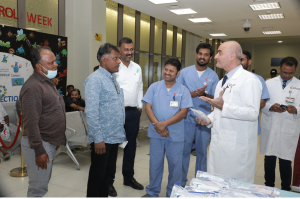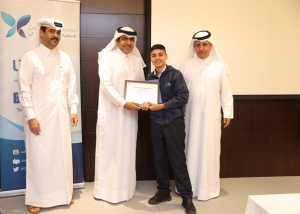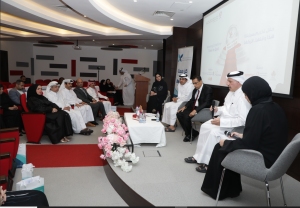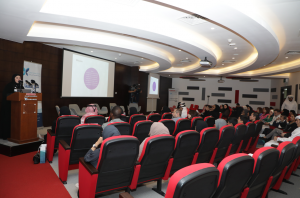I felt it twice, and I kept feeling it until I realized I needed to see a doctor about it. At the doctor’s office, I was told it was a muscle cramp; I was given painkillers and sent on my way. However, the pain came back when I ran out of painkillers on vacation with my sister; therefore, I made an appointment at a clinic in Istanbul.
When Faiza Al Kaabi – The owner of the story – went to her appointment, she described her pain to the doctor, who ordered some tests, and when the test results finally came back, her sister found out before her, and she could see in her face” Bad news. “
Faiza said, “I had lymphoma around the lungs, and the cancer had spread to my underarm and abdomen.
I was shocked–I couldn’t believe it. I had cancer. I used to participate in events to support cancer patients, and now they tell me I am a cancer patient. How did this happen? I had no bad habits that could cause cancer: I was active, constantly moving around. Why did this happen? Was it a test from Allah? Was it an affliction, and if so, for how long? Was it a punishment–what am I being punished for? What is my future going to be like? Will even I have a lot, to begin with? I had too many questions running around, colliding in my head. I was torn; one part of me thought it made sense that I had cancer. The pain was there (I could feel it); the test results were there, confirming the diagnosis. And yet the other part of me couldn’t make sense of it, and that part screamed, “This is me we are talking about! How can I have cancer!” But I did. I had cancer.
My head was a tangled web of thoughts, and the world was moving too fast. I needed to decide if I wanted treatment, and if so, I needed to start treatment immediately. I needed to decide where will I get the treatment. Will I return to Doha, get treated there, or stay in a foreign country? I needed to make too many decisions, and I needed to make them quickly. I couldn’t decide since I was still confused and in disbelief. Eventually, I pulled myself together and decided to get my treatment abroad with the same doctor who diagnosed me.
As my first chemo session approached, more and more people called me to tell me that I was strong and would get through it, and after a while, I started to believe it. I began to accept that I had cancer. By that point, some of the initial shock dissipated, but not all of it.
Everything changed a few days before Eid Al-Adha when I started chemo. The chemo shocked my body: I was constantly tired and vomiting, I was irritable and anxious, and I couldn’t eat without getting nauseous. I reached a point where I wished my mother would not visit me so that she would not bring me food that would make me sick. It felt as if I became a new person that didn’t know what she wanted or how to express it; I felt like I was in the middle of a storm, alone with a stranger that is supposed to be me, and my task was to get to know the stranger. I was in such agony that I prayed for patience to bear all this pain and the trials to come the day before Eid.
The first day of Eid came, and Faiza felt even worse. Her family looked as if they had been at a funeral. Everyone had a frown on their face. They couldn’t smile or be happy, and they couldn’t even wish each other a happy Eid. Eid seemed like a burden on her family, reminding them that while the rest of the world was enjoying this “happy” day, something was eating her from the inside out.
A week after my first chemo session was my birthday. The chemo was wreaking havoc inside my body, and I felt every little change the chemo was inducing. I felt the pain of every dying cancer cell and was exhausted. The pain was too much. I reached a point where I started to question why I was doing this. Why am I putting myself through this torture? Why am I bearing all this agony?
My reason became apparent when I saw the unshed tears in my family’s eyes and how hard they tried to make the treatment more accessible and make me happy. On my birthday, my sisters rented a yacht. On the yacht, they showed me how much they loved me; they prepared a birthday dinner with cakes and gifts and even wrote my name with a laser on Bosphorus Bridge. I was over the moon. I forgot about the pain and was too happy to think about it or feel it. In that blissful moment, I thought, “If I die after today, I will be content.” That day gave me an intense dose of happiness that kept me going.
My family treated me with love. They showed me how much they loved me through the little things. The smell of detergent bothered me, so they told me to leave the room whenever they wanted to use it. I saw how worried they were about me. My sister couldn’t sleep well and would wake me up and ask me if I was alright. My mother couldn’t eat because I couldn’t eat. She would cook me food daily, even though it was hard for her to get up and stand due to a leg problem. It soon became apparent that I feared leaving my family behind rather than fearing death.
When it was time for one of my sisters to return to Doha for her kids, I could sense her heart’s dilemma. She left a part of her heart with me, while the other part belonged to her children. We were all having dinner one last time before my sister went back to Doha when I broke the news to them. “I haven’t had enough of you all yet,” I said. “There are so many more experiences that I want to have with you. I want to grow old with you. I will bear it all for you; I will endure the pain, bear the nausea and the fatigue. I will come back for you, sister.” Everyone broke down in tears. I realized I was one of the lucky ones. I had so many people that loved me and cared for me. The people who weren’t physically with me called me every day without getting bored to check up on me.
It took me a while, but I accepted my illness. I was in a situation I couldn’t get out of. What was I going to do about it? My doctor told me that my chances of survival were high. Nonetheless, some people don’t get better and die. He said, “It’s still a disease, treat it like you would anything else, and leave the medicine for me and focus on yourself.” And that I did.
After my third chemo, I learned to live with my cancer. I had a chair in the bathroom for when I got dizzy and bags for when I needed to vomit. I knew that lemon made me nauseous, so I steered clear of it. I had one of my sisters sneak ice cream into my hospital room behind the nurse’s back since I wasn’t allowed to have any. I had my favorite books sent over from Doha to read them whenever I felt like it. I let my body adjust to the new reality of cancer and chemotherapy.
Even with my family’s unwavering support, I had moments of weakness. I was left alone in an isolated room for six chemo sessions, with no sound except for machines beeping here and there. I was starved of human interaction. I missed being with people and socializing with them. The loneliness of the treatment room, combined with the inconsistent illness that the chemo brought on, pushed me to a point where I couldn’t make the most straightforward decisions, so I surrendered my autonomy to those I trusted most, my family. During my moments of weakness, I felt insufferable pain that made me want to quit, but my sister wouldn’t let me. She would ask me to bear it for her if not for myself, which made me angry. I didn’t want to take this torture for anyone. My sister would leave me to my thoughts after my outbursts. I would think about what she said and remember why I started treatment in the first place: I started it for them.
Six chemotherapy sessions in total. It sounded like a lot and like the sixth session was so far away, out of my reach. Regardless, I did it: I finished the first course of chemotherapy, and now, it was time for the doctor to check and see if chemotherapy had any effect on my cancer.
I had no expectations for the test results. I was neither hopeful nor was I pessimistic. I didn’t want to have hope to get disappointed, and I didn’t want to think negatively. Whatever the test results were, I would have accepted them. I was in a place of tranquility. If the doctor told me the treatment didn’t work and there was nothing else he could do, I would be upset, but I accepted death. I didn’t take death as the end. Instead, I took it from a religious perspective. “If you yearn to meet Allah, Allah will also yearn to meet you.” That phrase gave me comfort and courage to face my death. My family, of course, wouldn’t hear any of this, but it was a possibility that we all needed to acknowledge. If the doctor told me I had a little while left, I would go back to Doha and gather all my loved ones to see them one last time before I departed this universe and entered another. If he told me my end was near, I would stay in this country until my time was up.
“Fayzah, I have some news for you,” said the doctor.
“What?” I asked.
“Good news,” the doctor answered. I expected him to say that my body was responding well to treatment or other things doctors say to their patients to motivate them. What he said next left me speechless and baffled.
“The test results are out: they show a healthy body.”
Everyone calls me a hero for beating cancer, but I do not feel like one. I had moments of weakness, for no one is strong regarding illness. Sometimes we can’t sleep due to a toothache. Imagine what it would be like to feel the ache of cancer and chemo. It has been a year since I got cancer. I don’t know if it will ever come back or when. Maybe I got cancer to change how I see things, to tell me that I needed to live my life better. However, I know I am stronger now, thanks to cancer.
My life was a dirty lens before cancer–blurry and unclear–and cancer helped me clean it and see the world. I stopped letting the small things bother me, for life is more significant than whatever little thing is trying to upset you. Cancer taught me to choose myself and those who love me over work because I am easily replaceable at work, whereas I am irreplaceable for my loved ones. I realized that losing my hair is nothing compared to losing my soul and that I should do whatever it takes to preserve it, for a single hair doesn’t determine my happiness, and my soul is what matters.
I am grateful that I belong to a community where strangers will reach out and ask about you, and other strangers will start a charity project in your name just because they heard you were sick. Nonetheless, I hope that one day people will stop treating cancer as if it were a disgrace: we, cancer patients and survivors, did not choose or ask for it.
I can say to those who were just diagnosed, “I prevailed, and so can you.” There isn’t a single disease on earth without a cure. Humans haven’t discovered the cures for “incurable” diseases. Listen to your doctor and only your doctor for medical advice, and focus on yourself.
I’m glad I put up with the treatment a year later because many things are worth the pain and living for. I’m so happy that I got cancer and went through this experience. Given the choice, I would not return to the way things were because I now see things.
I wouldn’t wish that someone would go through what I went through, but if someone has cancer, take it with courage. We can do this together. We are part of a supportive community that wants to be there for everyone. I am sharing my story as my way to be there for you.
















